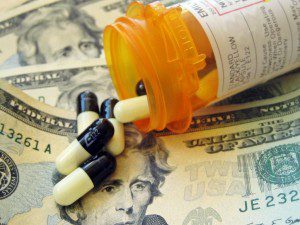Guest writer for Wake Up World
Prescription drugs are extremely prevalent in today’s society. While some drugs may be necessary in some situations, the fact that there are some drugs that carry health risks that exceed their perceived benefit is very real. Of course, this post is not to turn anyone off from taking their meds; in fact, it is simply here to educate you so you can be more informed when you and your doctor are making decisions regarding your health.
While it’s never a good idea to stop taking your prescriptions without your doctor’s approval, there are things you should know if you want to practice a natural lifestyle. I don’t want to share this to scare you, but merely to increase your awareness. With that said, let’s move on to 5 alarming facts you might not know about prescription drugs.
1. You Might Be Getting a Huge Dose of Someone Else’s Drugs
There are a lot of people and businesses—yes, even some hospitals—that still flush unused and expired medicine down sinks and toilets. [1] Flushing those means they enter into our water supply. Although no one’s really sure what that means for human and animal health, it’s probably not good. One researcher looked at the effects of birth control pills in our waters and noticed higher levels of estrogen ultimately making male fish infertile. [2] Another found alarmingly high levels of metformin, a diabetes drug, in Lake Michigan. [3] You could be getting a medicine you don’t need, and it seems it’s all in the water. (Also see: Environmental Research Reveals Seattle Salmon are on Drugs — Thanks, Humans!)
[pro_ad_display_adzone id=”110028″]
2. Counterfeit Drugs Are Common and Deadly
The latest scandal from China saw the seizure of over 440,000 chromium-laced capsules.[4] Normally made from edible gelatin, medical capsules are safe to eat, but these used industrial gelatin, something that left the toxic metal behind. Chromium can build up in the body causing organ damage, so the biggest problem now? Tracking down the other 90 million capsules sold by the illegal workshop. But this problem is nothing new; counterfeit drugs are disturbingly common in this day and age.
3. Approved Doesn’t Mean Safe
Antibiotics can have serious—sometimes, unintended—side effects. Many times, antibiotics are over prescribed; this overuse leads to antibiotic resistance, and ultimately to new bacterial strains that can’t be treated. These “superbugs” are even responsible for deaths, with the CDC reporting in 2013 that the U.S sees “at least 2 million infections and more than 23,000 deaths each year” from “highly-resistant bacteria.” [5] There’s even evidence that broad-spectrum antibiotics — those prescribed for major infections—could even be a factor in early childhood obesity. [6]
4. Antidepressants May Harm Newborns
Recent studies suggest that pregnant women taking antidepressants can pass the medications along to their unborn children via the placenta. [7] The biggest worry here is medicine that blocks a mother’s serotonin levels may affect the child’s development. [8]While you should never just stop taking these medications without a doctor’s consent, prenatal exposure to these pills can double a child’s chances for ADHD and lead to a number of developmental delays—even raise a child’s risk for autism. [9] [10]
5. Even Legitimate Drugs Aren’t Immune from Safety and Sanitary Issues
But it’s not just the counterfeit drugs I mentioned earlier that are unsafe. Compounding pharmacies — companies that mix unique or hard-to-find drugs — have been the subject of an FDA crackdown ever since an outbreak of fungal meningitis in 2012. [11] With 1-3% of medication coming from these pharmacies, the prescriptions can often be meant for cancer patients, so it’s nice to know the FDA is regulating these groups.
How to Get Rid of Unused Prescriptions
If you have prescription drugs that you no longer need, do not flush them down the toilet or throw them into the garbage. This can deposit them right into the water supply. Recently, the Drug Enforcement Agency (DEA) announced a plan to allow you to return unused pills to pharmacies in an effort to cut down on unintended water pollution!
Did you know about these facts? Tell us what you think in the comment section!
-Dr. Edward F. Group III, DC, NP, DACBN, DCBCN, DABFM
Article References
[1] Sutherly, B. Unused meds go down the drain, worrying environmentalists. The Columbus Dispatch.
[2] Kidd, K. Direct and indirect responses of a freshwater food web to a potent synthetic oestrogen. Philosophical Transactions B.
[3] Klaper, R. et al. Metformin exposure at environmentally relevant concentrations causes potential endocrine disruption in adult male fish. Environmental Toxicology & Chemistry. 34 (2).
[4] Gao, K. 90 million pill capsules laced with toxic metal are sold in China; 11 arrested.South China Morning Post.
[5] Centers for Disease Control & Prevention. Antibiotic Resistance Threats in the United States, 2013. Centers for Disease Control & Prevention.
[6] Bailey, L. C. et al. Association of Antibiotics in Infancy With Early Childhood Obesity.JAMA Pediatrics. 168 (11).
[7] Ewing, G. et al. Placental Transfer of Antidepressant Medications: Implications for Postnatal Adaptation Syndrome. Clinical Pharmacokinetics.
[8] Rabin, R. Are Antidepressants Safe During Pregnancy? New York Times.
[9] Clements, C. et al. Prenatal antidepressant exposure is associated with risk for attention-deficit hyperactivity disorder but not autism spectrum disorder in a large health system. Molecular Psychiatry.
[10] Harrington, R. et al. Prenatal SSRI use and offspring with autism spectrum disorder or developmental delay. Pediatrics. 133 (5).
[11] U.S Food & Drug Administration. Multistate outbreak of fungal meningitis and other infections. U.S Food & Drug Administration.
Previous articles by Dr. Group:
- How Turmeric Keeps You Looking Young
- 7 Toxins Harming Your Brain Right Now
- Top 5 Foods for the Pineal Gland
- 6 Things You Must Know About Colloidal Silver
- The Importance of a Kidney Cleansing Diet
- The 9 Best Herbs for Lung Cleansing and Respiratory Support
- 7 Best Foods to Support Kidney Function
- Lung Cleansing With Peppermint Oil
- Seven Facts You May Not Know About Coconut Oil
- 10 Best Herbs for Boosting Female Sex Drive
About the author:
 Dr. Edward F. Group III (DC, ND, DACBN, DCBCN, DABFM) founded Global Healing Center in 1998 and is currently the Chief Executive Officer. Heading up the research and development team, Dr. Group assumes a hands-on approach in producing new and advanced degenerative disease products and information.
Dr. Edward F. Group III (DC, ND, DACBN, DCBCN, DABFM) founded Global Healing Center in 1998 and is currently the Chief Executive Officer. Heading up the research and development team, Dr. Group assumes a hands-on approach in producing new and advanced degenerative disease products and information.
Dr. Group has studied natural healing methods for over 20 years and now teaches individuals and practitioners all around the world. He no longer sees patients but solely concentrates on spreading the word of health and wellness to the global community. Under his leadership, Global Healing Center, Inc. has earned recognition as one of the largest alternative, natural and organic health resources on the internet.
For more information, please visit Global Healing Center.
[pro_ad_display_adzone id=”110027″]







